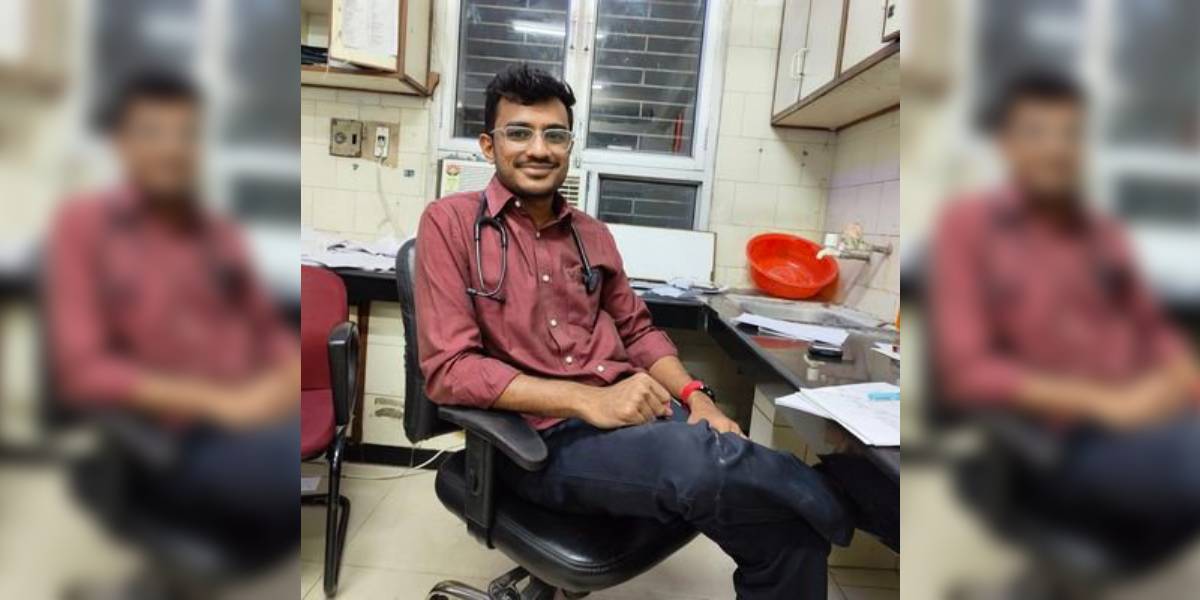Not all is well in medical colleges. A PG resident doctor in Delhi dies by suicide; psychiatrists highlight the importance of mental health awareness among medicos.

Dr Jay Dipesh Savla (X)
Dr Jay Dipesh Savla was a chess aficionado and a scuba diving enthusiast, his friends recalled after the 25-year-old resident doctor of Safdarjung Hospital in Delhi had died by suicide at his rented accommodation in South Delhi on 8 December.
The young doctor with a lively smile might have felt that he had been checkmated for good, prompting him to take the final plunge.
Dr Savla’s suicide brought to the forefront the critical issue of mental health, particularly of those in the medical fraternity. There has been an increasing number of medical students dying by suicide.
Against this backdrop, psychiatrist Dr Bhooshan Shukla, who deals mainly with child and young adults’ mental health, took to social media to express his concerns and offer insights into the mental health struggles faced by medical professionals.
“One more suicide. A young doctor studying at THE most prestigious institution loses life to suicide. I realised that he was following me on this platform. That realisation makes this even more sad at a personal level. Was there any way I could have helped him and prevented the tragedy? I dont know perfect answers to all these questions. Attempting to write a few that can be helpful for all young adult students (18-25 age group),” he posted on X.
One more suicide.
A young doctor studying at THE most prestigious institution loses life to suicide.
I realised that he was following me on this platform. That realisation makes this even more sad at personal level. Was there any way i could have helped him and prevented the…— Bhooshan Shukla (@docbhooshan) December 10, 2023
South First brings key insights from Dr Shukla’s thread on X:
Mental health’s complexity: Mental health is influenced by brain chemistry, formative experiences, and circumstances, with no single cause or simple remedy. Professional help is crucial.
Indicators of high suicidality: Feeling hopeless is a strong sign of potential suicidality, especially when combined with anger, agitation, and alcohol use. These factors together can be lethal.
The role of hopelessness: Hopelessness involves a lack of positive expectations for the future, a sense of futility in efforts, and feelings of being trapped or powerless, which are high-risk factors.
Agitation and anger: Anger combined with physical restlessness, inability to focus, disturbed sleep, and irritation at minor things are significant red flags.
Substance use risks: The use of alcohol and cannabis, especially among young adults, is concerning due to their accessibility, social acceptance, and peer normalisation, which can impair judgment and self-control.
Signs of mental health decline: Loss of personal meaning in work, social or emotional disconnect, access to lethal means (especially for doctors), and loneliness are major warning signs.
Ineffectiveness of philosophy: In situations involving these factors, philosophical discussions are less helpful compared to professional mental health assistance.
Stigma among doctors: Many doctors view psychiatrists negatively and prefer spiritual guidance over psychiatric help, perpetuating the stigma of mental illness as a sign of weakness.
Vulnerability to suicidal thoughts: No one is immune to suicidal thoughts, which can occur at any point in life. Recognising vulnerability and seeking help is effective in managing these thoughts.
While there are strict guidelines from the National Medical Commission (NMC) instructing medical colleges to ensure the formation of anti-bullying committees and also have a mental health professional who will help and counsel the students in any such issues with mental health, none of this is being implemented.
However, some doctors expressed concern. Dr Mukherji Madivada, senior interventional cardiologist and former president of the Indian Medical Association (Kukkatpally) said: “Most doctors responding to this sad event are calling for counselling of these young victims. It is a kind of victim-shaming. I believe that it is the tyrants and the offenders who need counselling. Not the hapless victims of inhumane conditions in training.
P.S: I don’t know the details of this instance, but of late, we are noticing this trend in medical training. I was fortunate to have loving teachers all through,” he posted.
Most doctors responding to this sad event are calling for counselling of these young victims.
It is a kind of victim-shaming.
I believe that it is the tyrants and the offenders who need counselling. Not the hapless victims of inhumane conditions in training.
P.S: I don’t… https://t.co/y4fiMn2B0E
— Dr. Mukharjee Madivada (@drmssm) December 10, 2023
Dr Savla was a victim of bullying, which he had spoken out in public.
“He actually made a public plea about this,” Dr Abby Philip, who uses the handle TheLiverDoc on X, said. “A real call for help.”
The young doctor, however, did not get the help he badly needed.
“Instead, a large group of Indian doctors on Twitter (X) taunted him more, harassed him more, gaslighted him to such a severe extent — he did not find the help he needed in the physical as well as virtual world. What have we come to?
No one helped him and possibly the toxicity continued to haunt him, physically and mentally
After 2 years of battling depression flamed by the professional training life, while in third year of his residency, he took his life,” Dr Philip wrote on X.
He also offered an advice. “Your life is more valuable than anything else in this world and only your family knows it. Stay safe and please take care.”
I am unable to get over this incident
A young man joined post graduate training at one of the best institutes in India
He started developing clinical depression due to workplace and senior toxicity
He actually made a public plea about this.
A real call for helpInstead, a… https://t.co/H28bFcbxpx pic.twitter.com/KnEBgFIVXP
— TheLiverDoc (@theliverdr) December 11, 2023